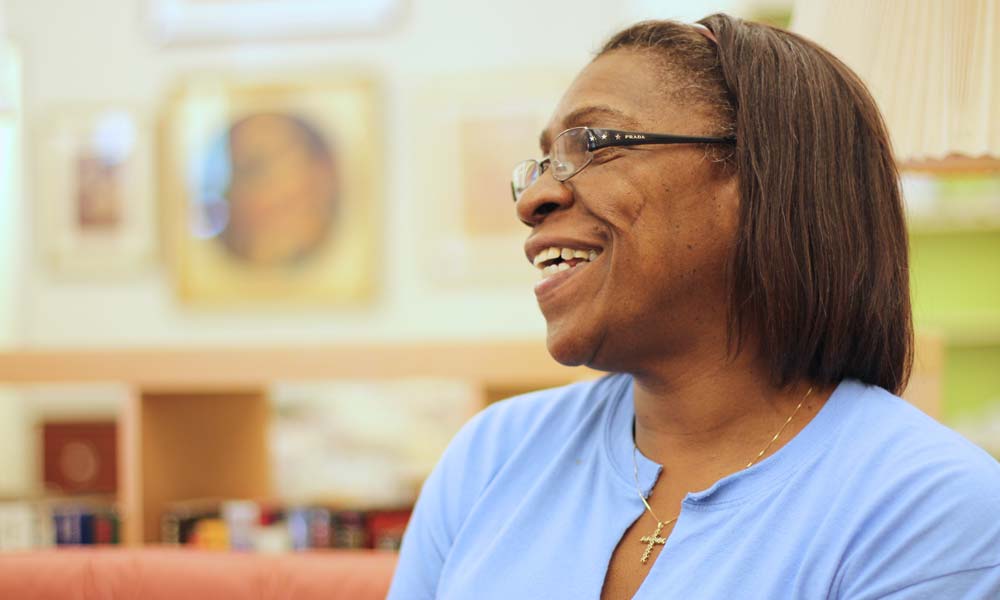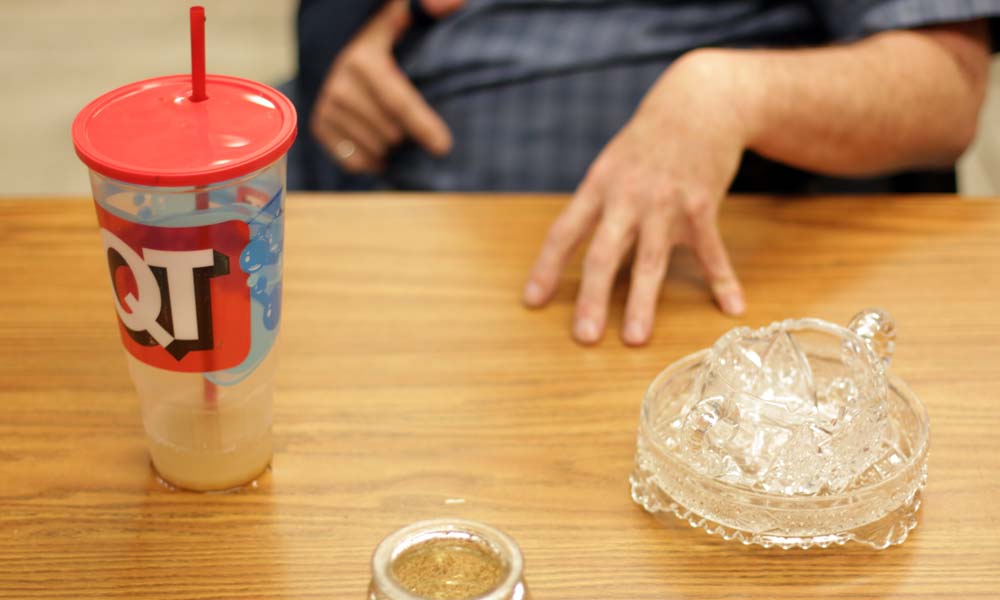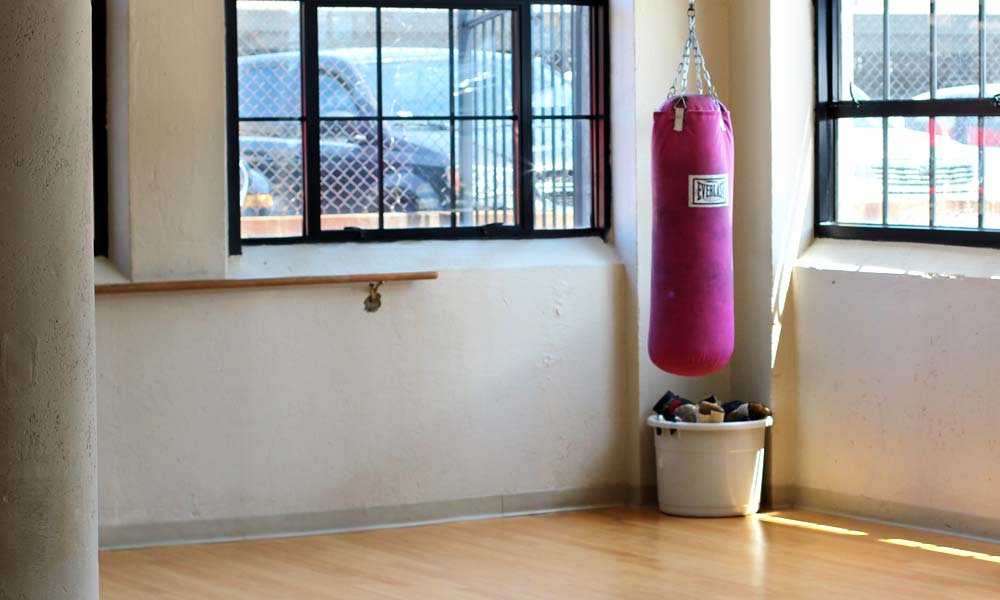Thrift Shop Provides a Second Home for Those Struggling With Mental Health
On the sales floor of the Clubhouse Shop, a resale store near downtown St. Louis, the furniture is carefully arranged into a series of mock rooms. Couches face each other across coffee tables, and tables are complemented by a full set of chairs, as if dinner guests were waiting in the other room. The store is run by members of the Independence Center, a local support facility for adults with severe mental illness, and all proceeds benefit the center's programs.
It's mid-afternoon, not quite hot yet — the air outside is like a pot that has just been put on the stove. The store is mostly empty. Terri Hodges, an Independence Center member who usually works the register, comes out from behind the counter and settles comfortably into a pink velvet couch on the sales floor. She has a wide, quick smile, and a thin gold cross hangs around her neck, resting in the slight v-neck she's cut into her t-shirt. Everyone that passes greets her by name. When she first started working in the store after coming to the Independence Center in 2002, visitors would often mistake her for a counselor at the center. "A lot of customers and some of the members thought I was staff," she says.
Terri was referred to the Independence Center by a local Social Security office while she was looking for a job. At the time, her mother had recently passed away, she had just lost her home, and she was staying in a rooming house with two former classmates. Two years sober from an addiction to drugs and alcohol, she turned to prayer for relief. "I was praying — 'What I'm gonna do, God, where I'm going to be at? My Mom's gone.' And self-pity set in," she says. "And you know, when you be still and you just listen for him, in that still voice he says, 'I haven't left you.' He says, 'I'm sending you help.'"
The Independence Center helped her find a new doctor, a social worker, and an apartment, and she started coming to the Clubhouse every day "so I wouldn't stay home, I wouldn't just be sitting — I already wasn't thinking right." Terri was diagnosed with paranoid schizophrenia during a stay at a state hospital, but it's not a label she fully agrees with. In conversation, she tends to use phrases like "mental illness" or "problem" instead. "I was a sick person. I'm a sick person. I can't do anything about my mental disease, but I can do something every day about how I'm going to handle my day," she says. "I'm a recovering addict, and I have to stay focused. Each day is a daily reprieve, so I have to keep that focus."

Terri Hodges has been a member of the Independence Center since 2002.
The lobby of the Independence Center has two doors: one leads to first floor member facilities, and one leads to the public resale shop. Behind one door, members sit in a waiting area, some dozing off to the sound of a fishtank in the corner, which has a small model of an ancient pyramid sunk in its gravel. Behind the other door, a raised dais displays a couch for sale and a blazer and jeans tucked precisely over a mannequin, vying for the attention of the traffic passing on Forest Park Parkway.
Terri started out working in the back of the store, sorting donations in an expansive room tucked behind two doors marked "Employees Only." "I would come in every day and just be busy, pretty much getting out of myself," she says. "My mom had died around that time, so I really needed not to be isolated. So just coming in, being around other people — and I was still pretty much to myself, just getting to know other people." Today, the walls in the back room are lined with industrial shelving that partitions items by kind: stacks of white lampshades, long-sleeve shirts, and down below in a corner, a stuffed bear the size of a child.
Clubhouse members price and clean all the merchandise before putting it out, explains Marco, another member who is taking a break at a laminate-top table in the center of the room. A gas station soda cup sits in front of him, condensation pooling in a ring on the tabletop. His favorite part of working in the store, he says, is processing donations, piecing through discarded items to find pieces that will live a second life out on the sales floor. He gestures with his left hand for emphasis, resting his fingertips carefully on the tabletop as he speaks; his right arm is in a sling, held close to his chest. His favorite finds are high-end designer pieces that can be reserved for the store's estate sale in the fall: Waterford crystal, Coach bags, Ralph Lauren clothing.
Terri gravitated towards the clothes, putting together flattering outfits out of the disparate donations. She soon moved onto the sales floor, where she would style members and customers shopping in the store. "I love fashion — I love anything that would brighten up my spirit," she says. "Ever since I was a little girl, [I've been] making up and dressing up. And so I guess that was just a part of me. That was the little girl coming out — the little girl in me."

Marco explains how the Independence Center's resale shop works.
Terri grew up in St. Louis, in a close-knit household run by her mother and father. Her mother kept a careful eye on her, making sure she didn't run past the front porch while she played. "I was closely kept," Terri says. Eating breakfast and dinner together was a family tradition, as was going to church together and gathering around the table during Christmas and Thanksgiving. "That was so important in our house."
Trouble started in junior high. "I was having problems here in school," she says, then clarifies, "I don't think I really had a problem — I think the girls were just picking on me. When your Mom works hard and takes you shopping and dress you nice, and I always have been smart — they was really picking on me." Girls would torment her and steal her food at lunchtime, and finally, she got fed up. Her mother sent her to school most days in a dress, but she began to secretly stow away Levi's blue jeans and tennis shoes in the morning, running into the locker room at lunchtime to change. "I was like Superman when he went into the booth," she jokes.
When she was in high school, the administration called her mother in for a conference, and soon after, her mother sent Terri to a doctor for an evaluation. Looking back, Terri thinks her mental illness had probably started to surface around this time, but she's not sure. Soon after, her mother got pregnant with Terri's younger sister, and sent Terri to live with her older sister in the county. "She probably didn't want the strain on her," Terri says. "I guess that's where [the schizophrenia] happened, but I really don't know. Today, if you asked me, 'Is anything wrong with you?' I'd tell you, 'No. Nothing wrong with me.'"
Terri started using drugs when she was 29, and more than a decade passed in a haze. "I got lost somewhere in that process. And that was probably it — pretty much it," she says. During those years, she received her official diagnosis of paranoid schizophrenia while staying in a state hospital. "It's probably when I was using drugs, so right there, my mind was cloudy. I was just shattered and broken," she says. "I remember I was in a dark place in my life." Her mind felt like a dungeon, where she was trapped by an unseen jailer. "It felt like I was locked up — somebody had me locked up and I couldn't get out. All the time, I had the key. So I just opened the door, and let light into my life … Those days was so dark, and now I forgot about that, actually forgot about that. Because it's a new phase of my life."
After coming to the Independence Center, she codified a routine that brought a new shape to her days: church on Sunday, Sunday School on Wednesday, regular Narcotics Anonymous meetings, and a visit to the Clubhouse every day. "It's still the same. And all of it is productive, and constructive, and it's positive," she says. She's developed a careful, mindful way of living, quick to analyze anger and self-pity and cut it off at the root. Before bed, she records the day's events in a journal and asks herself, "What part did I play?" "I'm not responsible for my mental illness, but I am responsible to try to do better, to heal, to live with it — to embrace it like this grey hair I got. Just embrace it. I'm not going to go dye it, I'm going to embrace it. Because it's going to keep coming up."

The Independence Center offers a variety of services to its members, including access to a gym inside the Clubhouse.
Avoiding trouble is like choosing to stay at home during a snowstorm. Outside, the roads are iced over, and the weatherman on TV is telling her to be careful, but there's still a part of her that thinks: "Oh, I know how to drive. He don't tell me how to drive my car." If she gives into temptation, turning her key in the ignition and heading for the highway, she knows her car will skid into the curb a few miles down the road. "I learned from my mother — she say you be going nowhere fast," she says. "If I'm going fast and driving on the icy street and I have an accident or get pulled over, really I was going nowhere fast … I was going fast, but I really wasn't going nowhere, because [now] I'm stuck."
A few years ago, Terri re-enrolled at Forest Park Community College, almost four decades since she first earned a Certificate of Proficiency in medical office assisting. "It won't hurt to give it a try," she thought. She was 58 years old, and on campus, she was surrounded by eager teenagers bragging about the A's they received on papers and midterms. "When I feel like I'm threatened, it's like competition," Terri says. "It wasn't a challenge — it was exciting." When she got stuck on an assignment, she would ask her classmates to walk her through the problem step by step. "I befriended a lot of teenagers," she says. "They helped me through the process. They always would tell me, 'Slow down, Miss Terri, you always jumping ahead of yourself.'"
Terri graduated on May 17th with an associate degree, and is planning to enroll at Fontbonne University later in the summer to complete her bachelor's. She wants to begin a career in social work. After graduation, she posted a photograph of herself getting ready on Facebook with the caption "It's never too late to graduate." "I got so many likes, it was awesome," she says. Sitting on the couch, she pulls out her iPhone and begins tapping through photos of the ceremony. Her 25-year-old niece photographed it all on Terri's phone, turning the camera around in one frame to take a selfie while Terri waited below in the crowd of new graduates. In a short video clip, a chorus of cheers rises in the background as a crowd of figures in black caps and gowns mills excitedly among a grid of folding chairs; suddenly, one of them turns to face the camera. It's Terri, smiling broadly and holding up both of her hands to flash peace signs for the camera.
"It's been an uphill journey, but I wouldn't trade it for the world," she says. "I never bash myself for my mental illness, or my drug addiction, or the loss of my family. I already know that. I know that, and now I can accept it." As Terri finishes talking, another member named Tish passes by in the hallway, and Terri calls out to her. There are clothes for the taking in the back of the store, she says. Tish declines, doubting they'd fit her. "Ok. We're going to work on that, hear?" Terri says, gently but firmly, and Tish looks sadly down at her waist.
"But you look good though, Tish," Terri adds.
"No, I don't. Stop lying," Tish says.
"Yes, you do."
"You see them thighs?"
"Come here. Come here," Terri says, and wraps her in a tight hug. The two women exchange muffled "I love you's" over each other's shoulders. "I love the members and they love me, because I'm a member too," Terri continues, after Tish walks away. "And we in a class all by ourselves, but we are not by ourselves."



